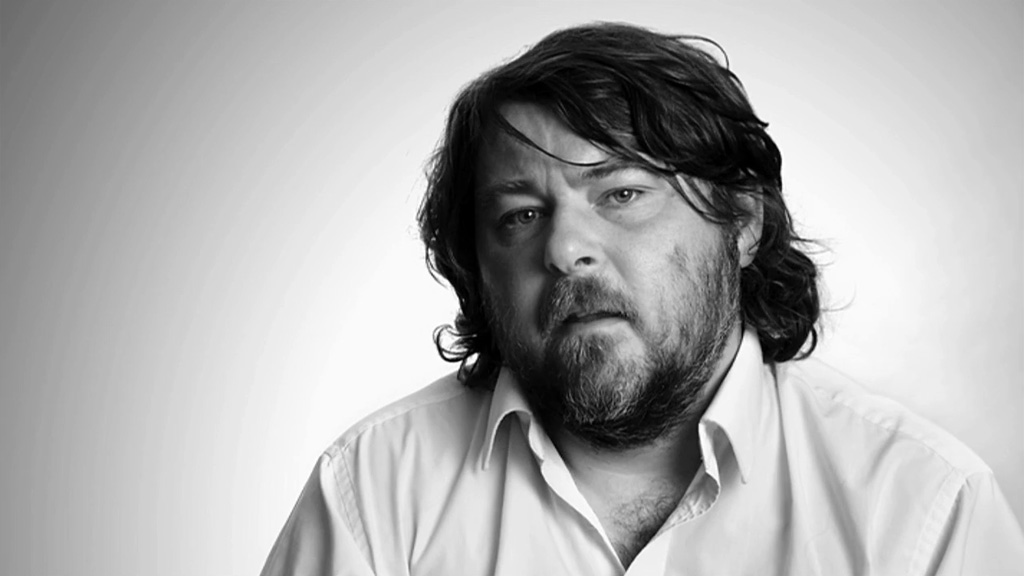
It’s evening and a violet shadow—pale—spreads over the city like ink dispersing in water. We’ve gathered at the Vancity Theatre in Vancouver for a late night special preview screening of High-Rise, the fifth feature from British firebrand Ben Wheatley.
“This is a film for audiences who want to see dogs being killed, and Tom Hiddleston naked,” deadpans Wheatley to the sold-out and enthusiastic crowd who can’t help but cheer him on with what he calls “the last big counterculture adaptation to go through.” Just before the lights dim Wheatley adds that, “No animals were killed during the filming, a few of them were very upset though.”
High-Rise is the film that Wheatley is in town to promote, but it’s certainly not all he’s willing to knock around as I’d discovered earlier that day.
An engaging artist, Wheatley’s tireless wit, lively conversation, and contagious love of cinema further underscores his own trenchant, imaginative, and somewhat thorny body of work. Truly I can think of no filmmaker today whose work is as dangerous, as exciting, and as unpredictable as Ben Wheatley’s is.
Anarchy in the U.K.
Wheatley, who was born in Essex in 1972, laughs good-naturedly when I ask him how he feels about all the Stanley Kubrick comparisons that seem to fall all around him like common confetti.
“It doesn’t help,” he chortles, adding, “I think it’s an impossible thing because if you’re criticized you feel cross but if people think your stuff is good then you just feel cross as well, so there’s no two ways about it. You can’t take any of that stuff to heart.”
Wheatley’s jolting body of work is yet to garner the same effervesce decoration as Kubrick, but by comparison, he’s a far more prolific and persevering force considering that in the last seven years he’s made five films, with a sixth, Free Fire, already in the can and due in cinemas later this year.
“I think the thing about being like other filmmakers is you can be in the tradition of them maybe, but when they made their films there was a certain financial system and a mindset that existed at that moment that can never exist again. So I don’t think that you could ever be like those filmmakers because it’s gone.
That moment’s gone and they were the only people that could do it at that time. Kubrick’s experiences and mine are so completely alien and different they can’t compare. I mean, things can look a bit the same but they don’t mean the same.”
Growing up outside of London––where he’d later attend art school––Wheatley sauntered and skimmed on the periphery of film and television a while before making it as a director. But even before that calling, at 17, he met his muse, Amy Jump, whom he’d later marry, and she’s written and co-edited pretty much every project together since.
“You get to 25 years-old and you haven’t made Citizen Kane and you feel a little bit sad inside,” shares Wheatley to the rapt crowd at the Vancity Theatre. “Then you’ve got Tarantino at 29 and I was like, ‘I’m 29 now, I haven’t made my Reservoir Dogs, fuck! Then you get to 40 as I was and you still haven’t made a film and you’re like, well, I’ve still got Ken Russell. Russell didn’t make a film till he was 50, so I was holding out for the Ken Russell backstop.”
Wheatley paid his dues as a runner at a post-production facility––“but not a very good one,” he chuffs––and some erratic employment as a storyboard artist before eventually making it, via a viral internet video with pal Rob Hill (Down Terrace) called “Cunning Stunts” that would bring him to the BBC to do an eccentric comedy show, Ideal. This stint was, in Wheatley’s words, “my film school.”
You’re only as good as the people you’re with
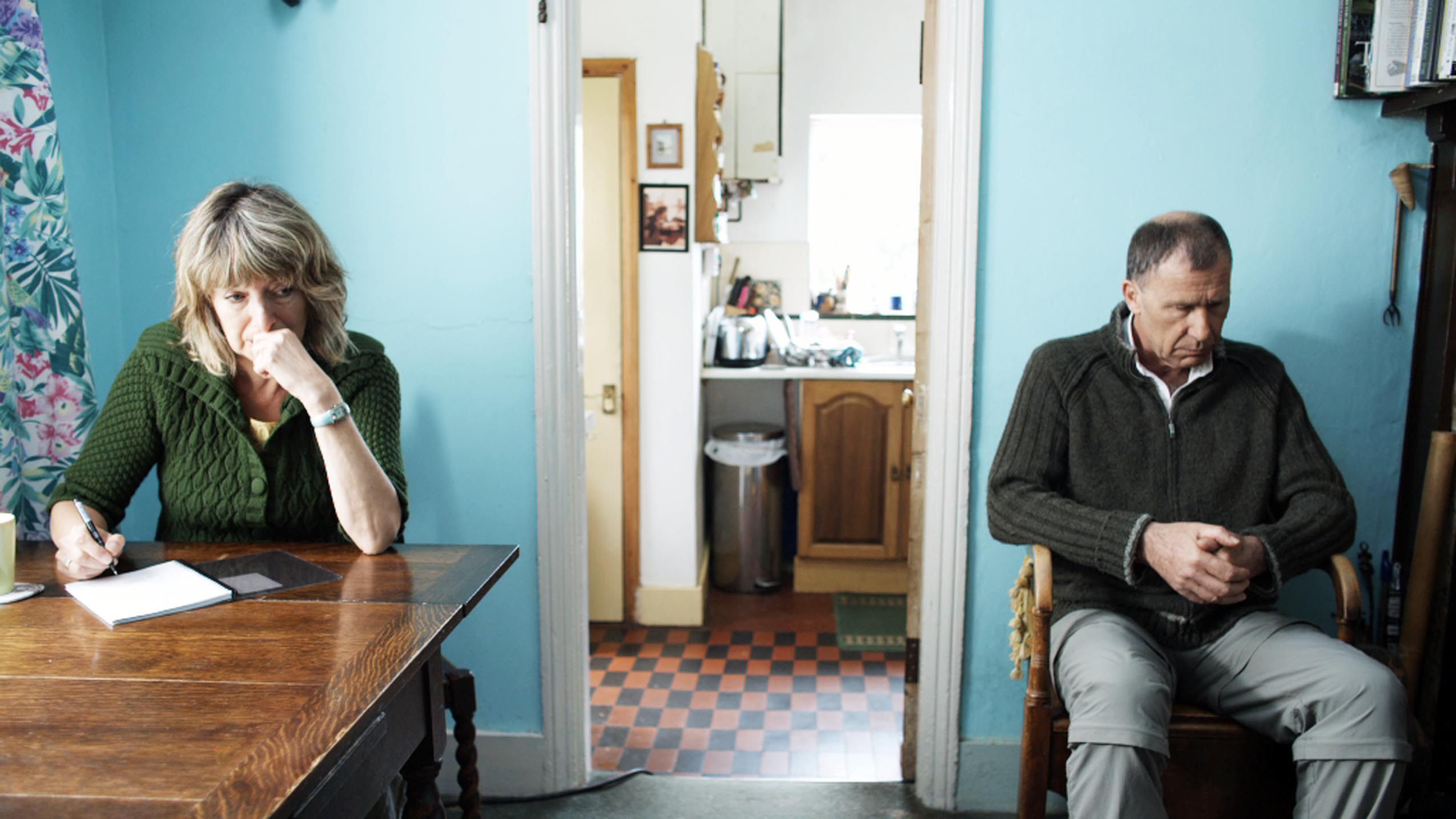
In 2009 Wheatley made his first feature, the fantastically funny crime film Down Terrace. A small budget affair, it was shot in star Rob Hill’s house in a scant and economic eight days. And while it was made modestly, it was a startling debut, showing a proficiency, a spirit, and an element of uncertainty that would become emblematic of all his forthcoming work.
Taste of Cinema: Do you ever revisit your films?
Ben Wheatley: Yeah, Laurie Rose, the DOP on all the films I’ve done, and I, watched all of them the other day, before we made Free Fire, the new one, just to remind ourselves what we’ve been doing.
Taste of Cinema: What’s that like when you revisit your earlier work?
Ben Wheatley: It’s like reading your old diaries. It’s fascinating but at the same time you can’t wholly remember the person you were, and you question, ‘these choices are odd?’, but because we all change so much, it’s like going back in time.
Taste of Cinema: When you look back and reexamine them, is there one that stands out? A favorite child?
Ben Wheatley: I like Down Terrace a lot because it was the first born, and then I like Kill List because, for one, it has a commentary track on the disc by me and Amy and that’s quite interesting to listen to.
Taste of Cinema: Down Terrace was shot so quickly, it’s hard not to be inspired by that kind of momentum. Do you have any advice for new filmmakers who might need that kind of haste?
Ben Wheatley: I think that you don’t need permission to make films, that’s the first one. And no one’s going to help you. And don’t bother going through any kind of perceived way of doing it that involves asking anybody else for help. You have to make your own mistakes and just believe in your own voice as much as possible, which sounds like just a load of platitudes, I know, but what we did with Down Terrace is we made it and we didn’t care what happened to it.
We made it and if it was going to be terrible, if we would have watched it and gone ‘pfft’, then it’d be put in a drawer and no one would ever see it. But we watched it and we liked it. We didn’t ask anyone’s opinion of it. You should know your own mind and know what you like and do that.
Come on, you devils
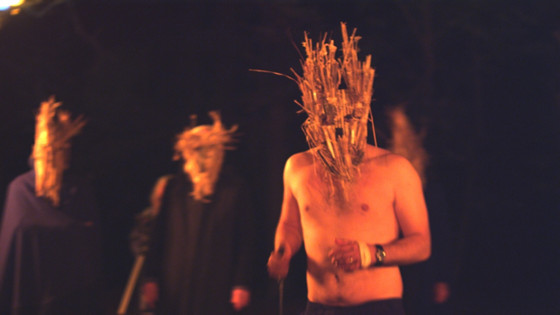
2011’s Kill List is a relentless and tense thriller that subverts expectation and morphs into one of the most frightening films in recent memory. A deliberate slow burn to start, Kill List establishes a mood and a tone that eventually and rewardingly ratchets tension and builds anxiety.
As the plot takes many unpredictable turns, humor is present to diffuse the mounting mental pressure, and Wheatley works the audience, making us anxious, and uneasy. The last half hour is all edge-of-your-seat suspense and the final scene is as unforgettable as it is disturbing and, ultimately, inexorable.
“Andy Stark, my producer, said to me, ‘make a horror film’,” Wheatley explains. “I thought, if I’m gonna make a horror film I’m gonna make something that’s truly as fucking horrible as possible. So when I wrote the script I made a list of my nightmares. My son, who was three or four at the time, was tied up in that, and I was terrified at that kind of aspect of fatherhood and so put that in. I had these reoccurring nightmares about cults since I was a little kid so I put that in as well.”
Taste of Cinema: At least among horror fans, Kill List seems to be the favorite. Have you noticed this?
Ben Wheatley: Because my films are all different they all get their own little discrete groups of people that like them. Sightseers people like a lot, they always come back to it. So, I think maybe Kill List is one that gets talked about more because horror fans are more organized, online, maybe.
In a deft and bloody flourish Kill List ups the ante of what the horror genre can do and makes for one shocking showpiece. No spoilers here, but the film goes to some strange, dark places and doesn’t pull any punches. It contains some appalling scenes of violence and inhumanity, yes, but it’s tempered, stylized and never exploitative. Kill List makes you flinch, it makes you squirm, it’s an earthquake of a picture that, once seen, you’ll never be able to abscond.
It was an accident, Mum
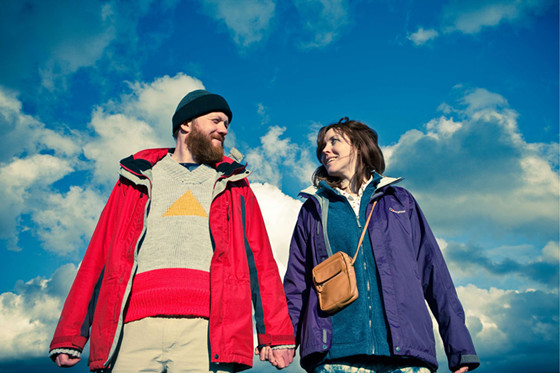
Sightseers (2012) lands like a lightning bolt, a bloody tale of a cross-country road trip that deforms into something I’ll describe as a light hearted killing spree. Kill List was still in post-production when Wheatley got a call about the Sightseers script, written by Steve Oram and Alice Lowe.
“I said yes without looking at the script,” Wheatley says with a laugh, later adding that “there was a massive amount of improvisation because those guys are so fucking good!”
Like all of his projects, Sightseers got a rewrite from Amy Jump, whom Wheatley never shies from giving heaps of praise and reverence to. As co-writer and co-editor, her influence on these films is highly-prized and approved.
“I think it’s very telling,” quips Wheatley, “that Sightseers is about a man who has a passion, and introduces a woman into a certain bit of behavior and the woman becomes much better at it then him and then has to get rid of him. My films are very personal, it’s not a coincidence that there are child men and strong women in them,” adds a self-aggrandizing Wheatley.
Open up and let the Devil in
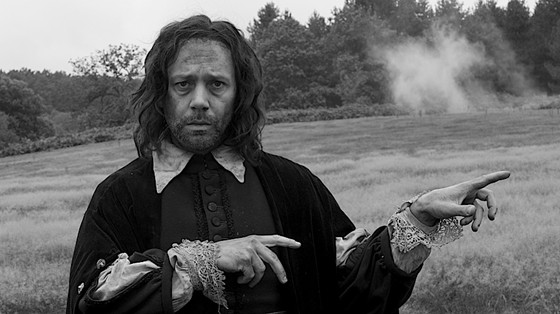
Blurring the lines between dream and reality is a right-hand aspiration for Wheatley, and his fourth feature, the incomparable A Field in England (2013), exemplifies this.
A black comedy masquerading as an arthouse horror film set in mid-17th century England, it sobs and squirms like the bastard child of Jim Jarmusch’s Dead Man and Michael Reeves’ Witchfinder General. But even those comparisons don’t do the film much justice. It’s a crazy, inspired, psychotropic Möbius strip that embraces moral ambiguity, resists tidy resolutions, and is more lively and enjoyable than it perhaps should be.
Taste of Cinema: If you had carte blanche on a project––any subject, any cast, an unlimited budget––what would that project be?
Ben Wheatley: A Field in England. Which I did have complete control over. I don’t know how you’d get more free than that. We were completely left alone, we could do whatever we wanted with that movie. I don’t think there will be a freer experience than that.
Though to be honest High-Rise I didn’t change under the pressure and with Free Fire I had director’s cut in my contract for that. But Field is a different thing because, even in the back of my head, there was no pressure about what the box-office would be, I just went, ‘this is wicked, it can be as bonkers as we like and there will be no problem.’
What at first feels like a hazardous handicap—setting the film wholly in a field—post-haste mutates into a great strength. The pastoral and familiar mise en scène grassland becomes a Grand Guignol chamber of horrors and, nimbly, comedy writ large.
“I wanted to make a proper midnight movie,” says Wheatley diligently, “like when you’re watching a Jodorowsky or Eraserhead or those kinds of films, and if we make it a certain budget we’ll be completely left alone to do that, so we did.”
Jump’s rapid and refined script for A Field in England not only combined unconventional elements that are catnip for the cult film crowd, it also functioned as a sort of Shakespeare intersecting Dennis Potter amalgam, streaming humor, dismay, and ideology with alacrity.
“I feel like there’s two kinds of movies that we make,” admits Wheatley, “one of them is about the development of couples and then there’s ones about a man or woman’s fragmented soul demonstrated by multiple characters in one movie. So A Field in England is that and High-Rise is that and it’s not coincidental that they’re both written by Amy.”
Our collusive madness is what we call sanity
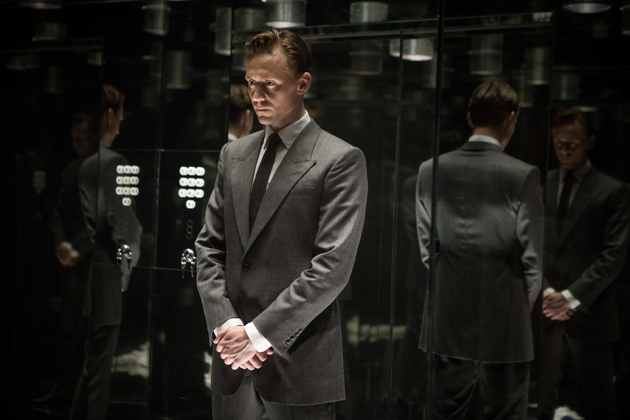
Adapted from JG Ballard’s subversive 1975 novel, High-Rise reveals the doomed denizens of a 40-storey luxury building who, over the course of three scant months, revert to ferocious barbarity, explore Freudian textbook extremes, and propound poetic self-destruction.
“It was great to have so much control of our environment,” says Wheatley, at last on a film with a considerable budget, allowing him to unleash a feast of visually dazzling and disturbing panoply. “I got to exercise a lot of muscles I hadn’t shown in my cinema work.”
Taste of Cinema: Was there ever a time when you weren’t going to set High-Rise in the mid-70s?
Ben Wheatley: We always wanted to do it as a period piece and there’s a few reasons. One is to set it into an imagined future––from today’s position there’s too much technology to deal with that doesn’t figure in the story––that would break the book. The idea that the tower is on its own on the edge of a city is gone with social media, for instance.
The idea that the people wouldn’t report back to the net about what they were doing. You’d have to build some kind of massive plot thing into that to make it work. Once you start doing that then the book is really undermined. So there was that. A period film and a science fiction film, in my thinking, are the same thing and they’re always shifting focus away from the now to make you take information in about this moment without feeling like you’re being talked down to by the filmmaker.
So if we set it now you’ll feel it’s all about globalization and the destruction of cities and the rich vs the poor and it will feel like some kind of agitprop political movie, whereas if you shift it––the future into the past––then suddenly you can look at it as an audience and feel like you’re not being shouted at.
Taste of Cinema: The 70s were so different than today, too. It means something else.
Ben Wheatley: Yes! The 70s for me is kind of the last point of optimism and imagination about the future, you know? Like once you hit punk and then you hit postmodernism and the idea of the future doesn’t exist anymore. If you imagine what the future is now for us, what is it? Maybe it’s some terrible bug that wipes everybody out, there’s no technological fantasy anymore.
We’re not going to the stars or we’re not building a base on the moon or anything. It’s a very small view of what’s going to happen, whereas in the 70s you could see it in the design. Even though it was tough times there was still the feeling that something exciting was coming.
Taste of Cinema: Do you feel like you accomplished what you set out to do with High-Rise?
Ben Wheatley: It depends how you approach projects. I don’t necessarily agree with the idea of filmmaking like carpentry where you have a plan and then you build the thing and you’re like, ‘fuck, that’s not right, we didn’t do it right!” [laughter] A lot of it has to do with what happens on set and your relationship between actors and the technical crew, you know?
For me it’s not like Hitchcock, his vision where everything is so completely planned and then he literally says he’s bored making the films because he’s already imagined it in his head. I have the film that I’ve imagined in my head but I don’t necessarily strive to make that film because that may not be the best version of the film, you know? Because, for instance, the actors bring something that I don’t have––otherwise I’d act in all the films and do that as well––but I can’t do it, and they’re much better at it than I am.
So you have to open, and be open to that side of the collaboration, otherwise you’re closing off a lot of things that can be really good in the film. So yeah, I think that High-Rise is the film that it was always going to be.
High-Rise grows progressively more coarse and uncivilized and also more and more hypnagogic; the boldface emblems of politics, the gallows humor, the stirred and kaleidoscopic visuals, they all alloy into a gloriously glum pageant. It’s a tour de force from a fearless filmmaker.
“There was a lot of shouting and sulking in the editing room,” shares Wheatley, unreserved, “sulking mostly from me, not Amy, and we thrashed it out.”
Taste of Cinema: What do you think is the filmmakers role in society?
Ben Wheatley: I think that there’s a role for filmmakers to express a point of view which maybe people haven’t expressed or come to yet. It’s also to entertain, that’s a big portion of it. And to tell stories and think about things that maybe other mediums aren’t thinking about. But I think it’s like, ‘what’s the filmmaker’s role?’, it’s more of a fundamental question than filmmakers.
It’s more, ‘what’s the role of narrative? What’s the point of telling stories?’ And it can be poems or songs or whatever and I think there’s two problems to this: one that’s a selfish one and that’s for the filmmaker or the narrator to try and make sense out of their own existence and then, two, it’s to try and tell everyone else what they’re thinking and feeling.
Taste of Cinema: When I saw A Field in England it was under ideal circumstances: a midnight screening, a festival crowd, who were into it. When it was over, the audience was stunned. My wife and I, we just crawled out of the theater. I carried that movie around with me for days, I couldn’t stop thinking about it. And High-Rise is the same way.
Ben Wheatley: Movies I like are movies that make me think. And if they’re movies I have to unpack at the time, I like that. And I like them to have some legs and some longevity.
High-Rise will be released theatrically in the United States on May 13th and in Canada on May 20th. Miss it at your own peril.
Author Bio: Shane Scott-Travis is a film critic, screenwriter, comic book author/illustrator and cineaste. Currently residing in Vancouver, Canada, Shane can often be found at the cinema, the dog park, or off in a corner someplace, paraphrasing Groucho Marx. Follow Shane on Twitter @ShaneScottravis.